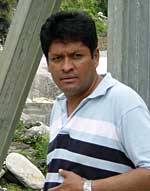 Forty years ago, the Soviet Union set up the 2.5 megawatt Panauti hydropower station. Moscow also built a portion of the East-West Highway, a hospital, the Janakpur Cigarette Factory, and other industries.
Forty years ago, the Soviet Union set up the 2.5 megawatt Panauti hydropower station. Moscow also built a portion of the East-West Highway, a hospital, the Janakpur Cigarette Factory, and other industries. After the collapse of the Soviet Union, Moscow's development aid to Nepal dried up. But in its place we have seen Nepali entrepreneurs who settled down in Russia take the lead in investing in private hydropower projects and many other ventures in their home country.
Many of the Nepalis went to study in the Soviet Union, got married and lived there. After the changes in 1990, because of their knowledge of Russian and English as well as their entrepreneurial spirit, they led the pack in Russia's fledgling private sector. After becoming billionaires, some of them are bringing some of their money home to Nepal. Not only as charity, but as investors to develop their home country, create jobs and run a proper business.
Arun Ojha, Tek Raj Niraula, Binaya Shrestha, Ghanshyam Thapa and Ram Shah run an electronics business in Moscow. They got together to set up the Sanima Group which launched the Rs 300 million hydroelectric plant on the Sun Kosi River. The project has Rs 110 million equity from Sanima and other well-known Belarus-Russian tycoons: Upendra Mahato, Niraj Shrestha and Jiba Lamichhane as well as loans from a consortium of banks led by the Nepal Investment Bank.
The project is located in Sindhupalchok and most of the work including the powerhouse construction and links to the national grid is complete. Power generation will start next month. Sanima Pvt Ltd's managing director Arun Ojha has had to battle red tape, six years, for this project. Another obstacle was the impression among locals that the project was a charity and not a private investment and the time wasted in paperwork. "It took us three years just to get the paperwork ready but the actual construction only took one-and-a-half years," Ojha told us, "If it hadn't been for the frequent bandas we'd have finished it in a year."
 Despite the delays, Sun Kosi's investors are happy with the progress and are already thinking of further investment in the 1.5 megawatt Upper Sun Kosi and another project in the vicinity. The group is also looking at a much more ambitious 15 megawatt Mai Khola project in Ilam in eastern Nepal.
Despite the delays, Sun Kosi's investors are happy with the progress and are already thinking of further investment in the 1.5 megawatt Upper Sun Kosi and another project in the vicinity. The group is also looking at a much more ambitious 15 megawatt Mai Khola project in Ilam in eastern Nepal. The investors of Sun Kosi have got together with other Russia-educated engineers and ITECO, SILT and CEMAT Consulting to set up the Molniya Hydropower Company which has started construction on the five megawatt Mailung Khola project in Rasuwa. The Rs 700 million joint venture involves a Chinese company, the Himalayan Bank and the Development Credit Bank in Kathmandu. Another Russian group wants to renovate Panauti into an advanced hydraulic lab to train power engineers and offer the power free to the grid, but NEA has not responded.
Sanima's plans to get into banking has finally come through this week with a Rs 320 million outlay in Sanima Development Bank which is a joint venture with other Russian Nepalis, a third-country partner and with 30 percent of stock options to be sold to the public.
Russia-based Nepalis have also been involved in media, health, education, finance and tourism. Mahato, Lamichhane and Ojha have invested Rs 120 million in Kantipur Television, and the three also have Rs 100 million in the Medicare Hospital in Kathmandu. Mahato owns stakes in Gongabu Bus park, Standard Finance, Salt Trading as well as the mobile telephone joint venture, SpiceTel.
 Krishna, Sambhu and Surya Rijal from Moscow have another group that has invested in Kathmandu's Hermitage Travel Agency and the Hermitage Hotel in Chitwan's Sauraha. The Nepali Russians are also involved in education. Recently-returned Tara Pokhrel and Pemba Lama with Mahato and Lamichhane have put in more than 40 percent of Rs 25 million authorised capital each in Acme and Kantipur Engineering colleges.
Krishna, Sambhu and Surya Rijal from Moscow have another group that has invested in Kathmandu's Hermitage Travel Agency and the Hermitage Hotel in Chitwan's Sauraha. The Nepali Russians are also involved in education. Recently-returned Tara Pokhrel and Pemba Lama with Mahato and Lamichhane have put in more than 40 percent of Rs 25 million authorised capital each in Acme and Kantipur Engineering colleges. More than 800 students are enrolled in Kantipur Engineering College and three batches of BE students have graduated from the Dhapakhel-based institution. KEC's principal Rameswor Rijal himself graduated in highway engineering from Minsk and says the characteristic of Russian investors in Nepal is that they don't look for immediate returns.
"They are in it for the long haul, sometimes it feels like they aren't really interested in profits, they just want the college to be sustainable and maintain the quality of our graduates," he says. Rijal would ultimately like to set up a technical university. "Nepal is at a point where we need a good technical university, one that would be a model not just for Nepal but also for the region,"
 says Rijal. Nepal's climate, economy and socio-economic status makes Nepal an ideal regional educational centre, he adds.
says Rijal. Nepal's climate, economy and socio-economic status makes Nepal an ideal regional educational centre, he adds. Asked what motivates them, Russia-based Nepalis say they would like to give back to Nepali society what they got from it. There is great sadness about the conflict and the state of the country and while this may be the reason other Nepalis abroad have given up on Nepal, it is precisely why Russian NRNs want to invest here.
What frustrates them the most is the bureaucracy and the hurdles the state puts in their way. Nepali officialdom is suspicious about where the Russians made their money. Says Sanima's Ojha: "Where we got our money from is for the Russian government to decide, it is none of Nepal's business. Nepal should be happy we are bringing the money in."
 The Royal Nepali ambassador in Moscow, Lila Prasad Sharma, has made encouraging of Russian investment in Nepal a priority. "They want to do something for their motherland, they have already invested Rs 1 billion or more. No Nepali from America or elsewhere has done that," Sharma told us, "Yet, back home, in Nepal, they are hassled."
The Royal Nepali ambassador in Moscow, Lila Prasad Sharma, has made encouraging of Russian investment in Nepal a priority. "They want to do something for their motherland, they have already invested Rs 1 billion or more. No Nepali from America or elsewhere has done that," Sharma told us, "Yet, back home, in Nepal, they are hassled." At the Foreign Ministry's Nepal Desk in Moscow, Nikolai Listopadov says: "At the moment, Russia may not be actively involved in aid in Nepal but our situation is improving. We are happy that there is greater trade and investment cooperation between Russian and Nepali entreprenuers."
Mahato, Lamichhane and others have investments in Cyprus, China, Italy and Korea. Given Nepal's red tape, they would never have invested here and the only thing drawing them is that this is the land of their birth. Says Mahato: "You can't stop helping Nepal just because there is a Maoist problem. In fact that is precisely the reason we should be helping."


